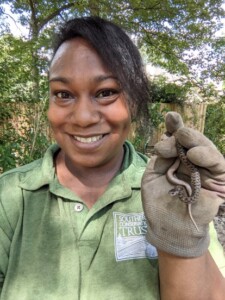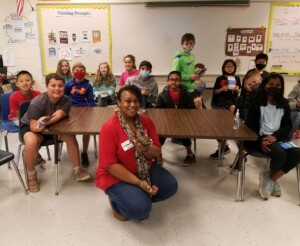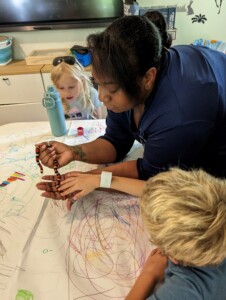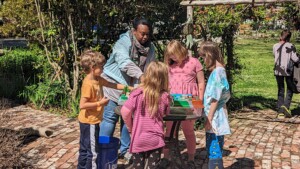
GFC Guest Blog by Charlee Glenn, Southern Conservation Trust
In June I was lucky enough to attend the Georgia Teacher Conservation Workshop, “Exploring Forestry and Wildlife in Georgia.” I’ve been a Project Wet, WILD, and Learning Tree Facilitator for a few years now and had expectations that this would be just another recertification opportunity with a few outings here and there. Nothing could be further from the truth.
To give you a little background, I’m the Environmental Education Programs Manager at Southern Conservation Trust and have been developing and leading environmental education programs for over 10 years now. I’ve seen a lot, learned a lot, and love the EE community in Georgia. I felt, however, there wasn’t a whole lot that I hadn’t done. Not anymore. I’m so grateful that my summer camp schedule happened to open up and allow me to participate in such a monumental trip!
From day one it was go-go-go, but I realize now that that’s because there was so much to see and do, and a week is almost not enough time. At the end of the workshop, many of us were sad to leave and agreed that we could have gone at least another two days!
As educators, we all know that there is no substitution for experiential learning. This program put that beautifully into perspective as we learned about Georgia’s forests, the forestry industry, and witnessing the start to finish process of turning a stand of trees into any one of the thousands of paper products we rely on every day of our lives. I can tell that this workshop has been tweaked and tailored to give educators a carefully curated experience with much to take away, to apply to our professions, and to bring back to our students.
The first takeaway, for me at least, became an “Ah-ha Moment” before the end of the trip. At first glance, the logging industry can incite a pretty negative reaction. Experiences we are all familiar with are the huge trucks on the road with dozens of mature, oxygen-producing trees that have been chopped down in the prime of their lives. I’m aging myself with this one, but once we get past the “Final Destination” moment, we move straight to Fern Gully and fixate on the “can’t you feel its pain?” The thought ends there with no consideration given to how your tires were made, what you had for breakfast, the desk you use at work, what your house is made of, or how you got your Chick-Fil-A order home. Learning that Georgia has one of the leading forestry industries in the world, exporting more than 25% of the wood used globally despite making up only two percent of the world’s forest, really puts into perspective that to be one of the forerunners, this industry has to be sustainable on the highest level! Knowing that for every tree harvested here there are three more planted, not only puts your mind at ease but makes you want to cheer on the crew harvesting the trees with some seriously sophisticated equipment.
Aside from the forestry management and wood/paper production side of things, we learned that this industry employs so many individuals and families with all levels of education. The salaries are competitive, not only for positions requiring advanced degrees in chemical engineering, but also for those that only require a high school diploma or GED. There was a great focus on the career paths, experience, and training needed and how to get your foot in the door. Not all students are college-bound, but that doesn’t mean they can’t make a meaningful contribution to society with the work that they do. It also doesn’t mean they have to work retail or fast food just to get by. Forestry is a viable and dynamic career field with lots of opportunities for growth and advancement. We had a chance to chat and share a meal with some of the employees at the paper mill and the pride that all of them exhibited in their work was genuinely heartwarming. The love and passion that each person had, from managing the equipment or people to checking the final products as they rolled out the door, gave me a deeper appreciation for the work and care that goes into this field every step of the way.
I’m so grateful to have had this experience! I had no idea what I was in for but will never forget this trip. I’m still checking the paper products in the grocery store, looking for the SFI stamp. No spoilers! I’m already planning to offer a Forestry Day Homeschool program this fall so that I can share all that I’ve learned during the workshop with the community that I serve. With my arsenal of games, activities, and investigations from the Project Wet, Wild, and Learning Tree teaching guides, I know I will.



